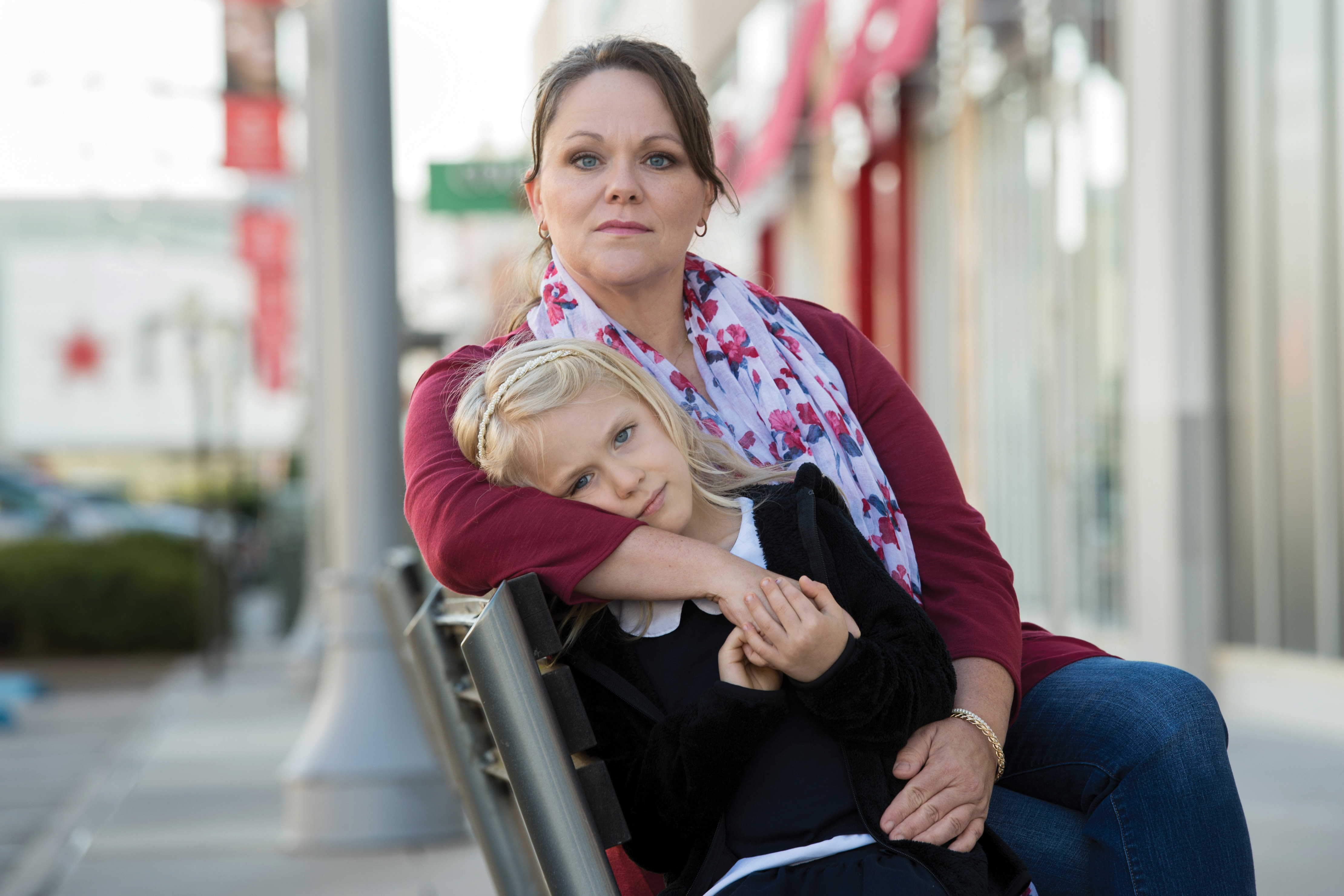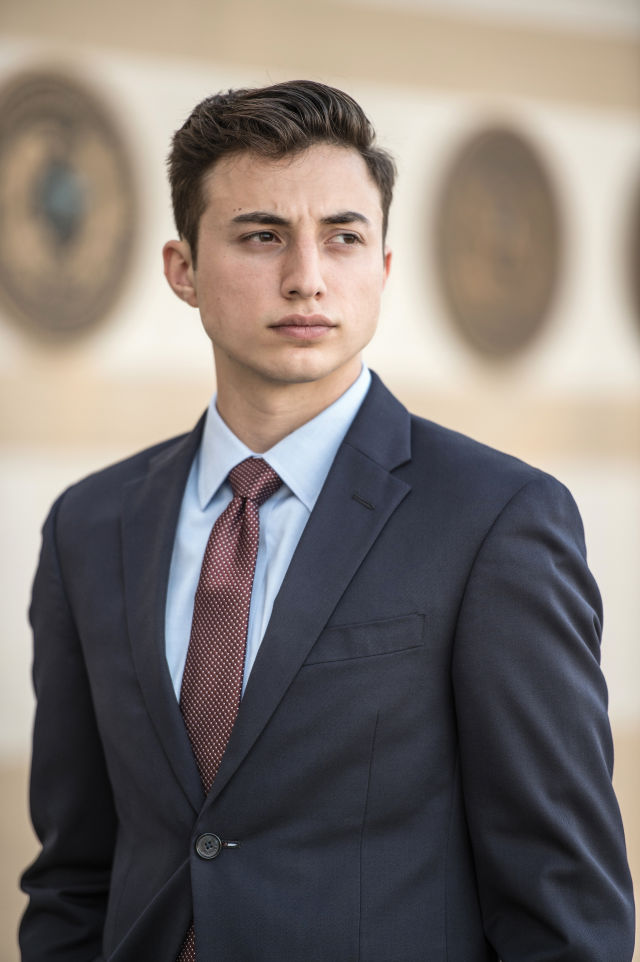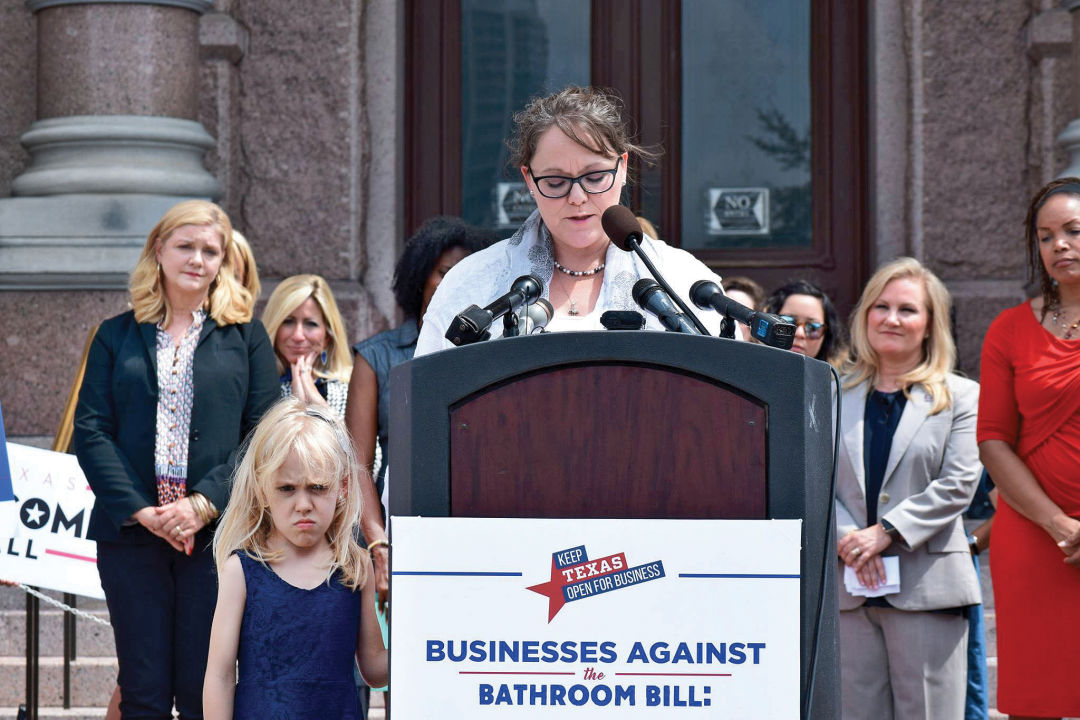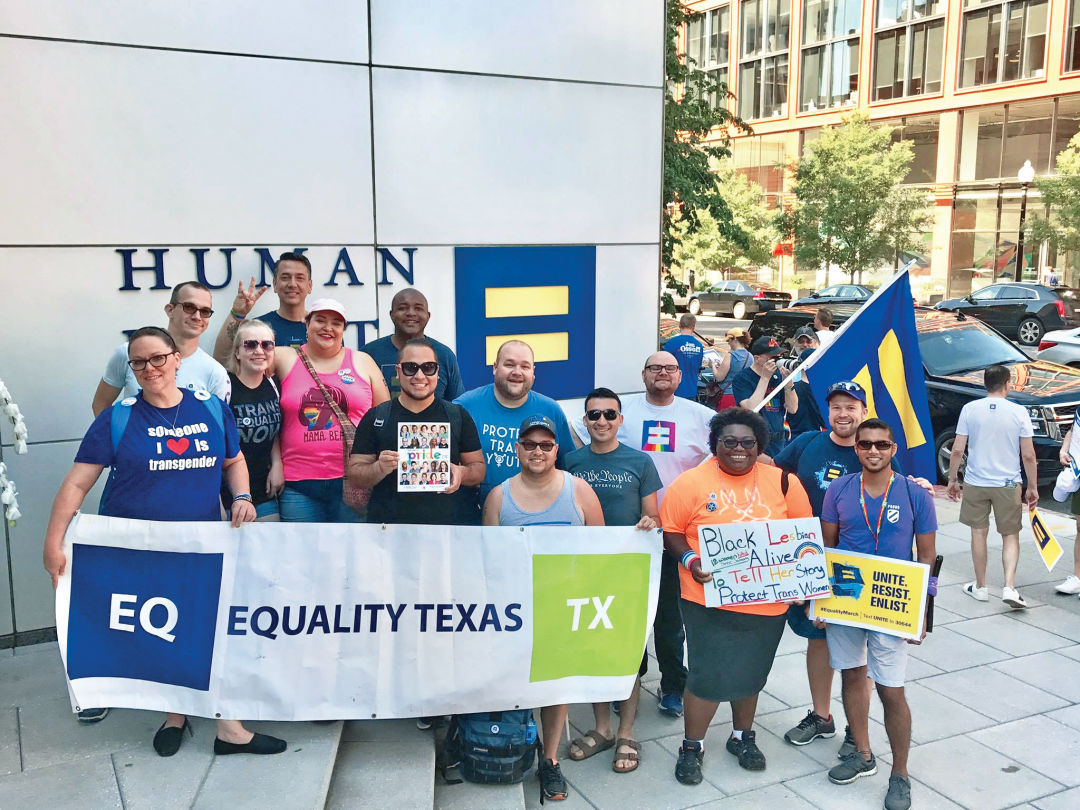
How a Pearland Mom Changed Her Life to Save Her Transgender Child
One afternoon in August 2016, an everyday suburban mom, her hair pulled back, wearing a conservative sweater, approached the microphone at a Pearland ISD school board meeting. Her voice quavered a bit as she read from her prepared statement.
“I am an ordained minister, and I am the parent of a transgender child at PISD,” began Kimberly Shappley. But before she got that first sentence out completely, John Kelly, district superintendent, pushed his chair back, stood up, and walked out.
Shappley continued, explaining to the remaining school board members that transgender people have much higher rates of suicide, and that transgender children raised in a supportive environment fare much better. She urged the school board to allow these kids to use the bathroom of their choice; she said that Kelly, still out of the room, was promoting hatred and violence against LGBTQ people.
The superintendent returned to his chair at the end of Shappley’s allotted five minutes, just in time to hear her closing remarks. “I’m a mom of a little girl that I would like to see live,” she said, looking up at Kelly from her paper. “Please understand, I’m not fighting about bathrooms. I’m fighting about her life.”
It was a fight Shappley had never expected to wade into—certainly not on the side of LGBTQ people. Born in Alabama to an ultra-conservative family and raised in Mississippi, Shappley is a self-described conservative Christian minister and former Tea Partier who peppers her conversation with religious ruminations. “The Bible is the inspired word of Christ,” she’ll say.
But a lot has changed in a short time for Shappley, whose entire worldview—and self-image—shattered the moment she finally decided, after a long struggle, to let her daughter Kai be herself.
Earlier that summer, President Obama had issued guidelines to schools across the nation regarding transgender students’ access to bathrooms. Those guidelines, which have since been rescinded by the Trump administration, held that gender identity is protected under Title IX (which forbids sex-based discrimination at educational institutions that receive federal money), and that trans students who were unable to participate in all school activities, in accordance with their gender identity, would have legal cause for a civil rights claim.
The guidelines didn’t necessarily require that students use the same girls’ and boys’ facilities that the rest of the student body uses, but they did require that schools recognize each student’s preferred gender and make school-wide policies in keeping with that.
In Texas, the backlash was swift, spearheaded by conservative politicians and Christian congregations. In Angleton, 30 miles down Highway 288 from Pearland, a minister at the Central Church of God brought up Obama’s guidelines in a sermon recorded in a Facebook video that has now been viewed nearly 40,000 times.
Pastor Brad DuBose, calling on his congregation to “act to protect our sons and daughters no matter what the local state or federal laws say,” exhorted them to “mobilize and strategize” against the “militant homosexual agenda.” He asked parents to tell their children to use the teacher’s restroom at least three times a day as a form of protest, and explained plans for a boycott of Brazoria County public schools. “You will not have this generation!” he yelled from the pulpit to loud “amens” from the crowd.
Up the road in Pearland, the Houston Chronicle asked John Kelly what the district planned to do in regard to the federal guidelines. “In my personal opinion, this is one more example of unconstitutional interference and social engineering by the federal government,” he said. “A hostile vocal minority now rules in America, aided by an apathetic, unengaged majority. What’s next? Legalizing pedophilia and polygamy? Unless we return to the Biblical basis on which our nation’s laws were established, we are in serious trouble—and cannot expect God’s continued favor.”
At the state level, Texas filed suit against the Obama administration, and Lieutenant Governor Dan Patrick championed a proposed bathroom bill, Senate Bill 3, which would require Texans in government buildings, including schools, to use the bathroom that corresponds with the sex on their birth certificate, declaring it a legislative priority. The controversial bill drew national media attention, as Patrick butted heads with House Speaker Joe Straus, a moderate Republican who opposed Senate Bill 3 and told The New Yorker, “I don’t want the suicide of a single Texan on my hands.”
In another life, Kimberly Shappley could well have been part of that Angleton minister’s congregation, and even counted herself among the bathroom bill’s ardent supporters. But that was before.
When she was living back home in Mississippi, Shappley dropped out after ninth grade to get married; she had her first baby at 16. Economic opportunity brought her to Texas in 1991; much of her extended family had settled further down Brazoria County, in Sweeny. She is mom to seven children, three of whom are grown. Kai, who will be 7 this month, is her second-youngest.
Born Joseph-Paul in 2010, Kai told her mom she was female as soon as she was able to articulate thoughts on gender. Shappley fought hard against it: She spanked, she cajoled, she gave time-outs that lasted nearly all day. Still, Kai was adamant—she was a girl, and she wanted to dress, act and be treated like one.
Over the next few years, several things happened that would change Shappley’s mind about the way she was parenting Kai. First, in 2015—after earning her GED and spending five years working as a licensed lactation consultant—she started nursing school at Alvin Community College, digging into her courses on biology, chemistry, anatomy and psychology. Suddenly, she had access to peer-reviewed studies in academic journals about the science behind being transgender, as well as its impact on mental health. Forty-one percent of transgender people, she read, have attempted suicide. It’s a statistic that stuck with her—and scared her.
Kai, for her part, was relentless. “You know I’m a girl,” she’d tell her mom when she was as young as 3. One night, when Shappley was tucking her child into bed, she noticed Kai—whom the family still called Joseph—had cold legs; she’d taken the underwear off a much-too-small doll and put them on herself, restricting her blood flow. But the final straw came one day, when she heard Kai praying. “She was praying that Joseph could go home to be with Jesus,” Shappley said. “My kid was praying to die, and depressed, and getting in trouble, acting out—behavior issues that, I have to tell you, after Kai was allowed to transition, all of those behavior issues completely stopped.”
Kai began growing out her hair and wearing girls’ clothes at age 4. “Although it took me two years to let Kai transition, I knew a year before that, that I had to do it. I just couldn’t,” she said. “I just couldn’t, because of my quote-unquote religion, and I couldn’t because I knew that I would lose my family, and I knew that I would lose friends, and I knew that my life was gonna get turned upside down. And that people were gonna judge me.”
We first met Shappley in May 2017, at a Heights coffee shop. Coming from a meeting with Equality Texas, an LGBTQ activism group, she pulled up in the passenger seat of local trans advocate and trans man Lou Weaver’s car. “A year ago, if you’d said to me, You know, you’re going to consider someone who identifies as a queer transgender man one of your best friends, I would’ve been like, No,” she said, smiling.
If the decision to let Kai transition was tough, the fallout was even tougher. Today, Shappley doesn’t speak with her mom, her siblings, or quite a few other members of her extended family. Her best friend of 20 years abruptly stopped answering her phone calls. Some people at her church—the Lakewood megachurch—turn and look the other way when she makes her way down the aisles, pretending not to see her. And while she declined to speak with Houstonia about Kai’s father, she did say that, now, “It’s just me and my kids.”
At first, Shappley told us, she planned to let Kai start kindergarten as a girl, telling only her teacher and the school nurse. “I don’t know what I was thinking, like we were just never going to be seen again by anyone that knew us,” she said. “I hadn’t thought that far in advance.”
At the end of the school year before Kai started kindergarten, when Shappley first met with school officials, it seemed like her plan might work. But shortly after that, Kelly gave his “pedophilia and polygamy” comment to the Chronicle and publicly outlined Pearland ISD’s policy, which requires transgender students to either use the bathroom that corresponds to their sex at birth, or a single-user restroom, such as the one in the nurse’s office at Kai’s school.
Shappley received a phone call from the school, informing her that Kai would need to follow PISD policy. “That’s when I reached out to Equality Texas, that’s how I met Lou Weaver, and that’s when we had to out ourselves—we were no longer in the closet,” she said. “It was all because of this bathroom issue.”

Mike Floyd, Pearland ISD board member, learned a lesson in tolerance from Kai.
Image: Michael Starghill Jr.
In May, less than a year after Shappley gave her speech at that school-board meeting, causing the superintendent to walk out, three new Pearland ISD board members were sworn in to a packed chamber whose air was full of tension. Shappley herself was back again—Kai, wearing a purple dress and matching headband, in tow—sitting in the front row and live-streaming the event. Next to them sat trans advocate Monica Roberts and several other LGBTQ supporters. They had come to cheer on one new member in particular, a lanky young man with a thousand-watt smile named Mike Floyd.
At just 18 years old, the well-spoken, clean-cut and charismatic Floyd is a born politician. He ran for the seat while still a senior at Dawson High, on a platform largely at odds with Superintendent Kelly’s, and managed to pull off a surprise upset of two-term incumbent Rusty DeBorde. Floyd’s election was, perhaps, a signal that business as usual for PISD might not be cutting it anymore in the increasingly diverse city of Pearland.
Floyd told Houstonia that when he first heard about the transgender bathroom debate, it was through conservative messaging about predators in girls’ bathrooms. “At first I said, ‘Of course you want to protect kids in the bathroom.’ I’m ashamed of it now, but I was under the influence of the right-wing media; I saw so much spin, and that’s all I saw,” he said.
But then he met Shappley and her daughter. “The moment I met Kai, my opinion changed completely,” he said. “I have a younger sister a little bit older than Kai—she’s exactly like her. I put myself in that shoe, and said, ‘How would I react if this were my sister?’”
When he heard about Kelly’s pedophilia comment, he was spurred to action. “When I saw how the board that I now sit on was treating her,” he said, “demonizing and dehumanizing her, I thought, ‘If no one is going to stick up for her, then I will.’ They are children in our community, and they deserve respect.”
Floyd, one of the youngest-ever elected officials in Texas, is attending the University of Houston while serving on the board. During his campaign, he was the beneficiary of his opponent’s poor judgment—DeBorde wrote an anti-Islamic Facebook post about a Muslim city council candidate shortly before the election that helped nudge the 18-year-old to a 54 percent victory. But Floyd believes that the issue of transgender rights—which he maintains students in PISD schools overwhelmingly support—was a major reason for the win.
“Right now, we are sliding down a very slippery slope with ‘us versus them.’ Standing up for everyone is really what we need to do, and history will show this,” Floyd said. “One day, every individual will have equal rights in this country, and they will wonder, Why on earth were these people in Pearland, Texas, treating children this way?”

Shappley and Kai fighting the state bathroom bill in August
Image: Teddy Wilson/Rewire
We met up with Shappley again at the end of this summer, after she’d spent weeks shuttling her kids back and forth between Pearland and Austin.
The state's bathroom bill controversy hadn’t ended as the Texas Legislature’s session closed in late May. As it wound down, House Speaker Joe Straus held firm against bringing the bill to a vote, and the House instead passed a weaker version. Lieutenant Governor Dan Patrick, meanwhile, maneuvered a stalemate on a few must-pass pieces of legislation, including a bill that would allow the state to extend the life of important agencies such as the Texas Medical Board, pushing Governor Greg Abbott to call a special session. Abbott then doubled down on the bathroom bill, calling it one of his top priorities for the 30-day session, which ran mid-July to mid-August.
Over that period, Shappley and a statewide network of LGBTQ activists took turns descending on the Capitol steps, sitting in closed-door meetings with legislators and speaking at press conferences. Shappley and Kai’s story—that of a conservative mom fighting for her trans daughter in ruby-red Texas—made national news. Slate called the two the “face of resistance to Texas’s bathroom bill.”
Their efforts paid off. The widespread activism, combined with a wave of powerful corporations vocally opposing the bill—including tech heavyweights like Apple, IBM and Facebook, but also energy titans like Shell, ExxonMobil and Chevron—killed it before it was able to reach the House for a vote.
Shappley was happy and exhausted. We wanted to know: Did she feel victorious? “You know, I do feel good, but it’s still an incomplete victory. We won this battle, but we haven’t won the war,” she said.
A priority for a number of Texas’s top legislators, some version of the bill will likely be reintroduced during the next session in 2019, or even sooner, if the governor calls another special session.
Moreover, the recently defeated bathroom bill, Shappley reminded us, was an attempt to stop school districts like HISD—which has a trans-inclusive policy in place—from allowing kids to use the bathroom of their choice. There is still no rule that would block school districts like PISD from restricting transgender students’ bathroom access.
Staff and teachers have been kind to Kai, Shappley said, and a second single-user restroom has been installed at her school. Nevertheless, the girls’ restroom remains off-limits.
“Before session started, I was already fighting the school district for my daughter to use the correct restroom,” Shappley said. “School started Monday this week, and I’m still fighting the school district for her to use the right restroom. So the bathroom bill being squashed doesn’t change anything for us at school.”
She and her daughter’s lives, Shappley added, have gotten much more complicated since they became the public faces of trans advocacy while residing in a town where the tension between old and new is palpable. Now a target for hate mail and even threats, she keeps her bills in other people’s names and uses a post office box to collect mail. She still posts pictures of Kai on social media, but she posts them late, she said, “so you won’t know what outfit she’s wearing at school today.”
A few miles up the highway from where they live, Kai could attend a school district where she could use the restroom of her choice. On rough days—like the one last year when the nurse locked up her office and Kai wet herself while waiting to access the single-user bathroom inside—that thought is enticing.
“I think about moving. I think about moving all the time. But right now, Mike Floyd ran for school board because of my kid and he got elected, so we made a difference for everyone in the school district,” she said. “So, I say we’re going to stay here and we’re going to prove a point and we’re going to make a positive impact just by being present. But at what point do you say: Let’s just go somewhere where we don’t have to make a point, and we can just blend in with the wallpaper and have a normal childhood?”
She waited a beat, then answered her own question. “The key is just watching my kid. She tells me the story about how the bathroom situation is going at school and she just laughs and she’s like, Whatever. So, the key is for me to really watch her so that there’s not underlying damage being done and I’m not aware. With Kai, it’s just important for me to … I hate to say it’s important to me to follow her cues, because I know the attacks that are going to come, like, You’re the parent, you direct them! But the truth is, I really don’t parent that way anymore.”
Throughout this entire experience, Shappley has been evolving as a person, although she herself remains unsure where her transformation will lead. She’s struggled with labels like “conservative” and “Republican” that felt so comfortable in her old life. “I don’t know what I identify as,” she told us. But one label that never wavered, in spite of Shappley’s feeling increasingly uncomfortable at her current church, is “Christian.”
“Being Kai’s mom has taught me more Christian values than being in church every Sunday ever did. It’s taught me compassion, empathy, love—unconditional love,” she said. “I always thought that I was a super-awesome Christian. And that’s a big part of the problem. The truth is, as a Christian I just got it so freaking wrong for so long, you know what I mean? Really, really wrong. I guess you could say I’ve learned to be empathetic because I didn’t find any when I needed it.”
Last June, Shappley was asked to give the keynote address at the Houston Pride Parade. She took the stage after LeAnn Rimes, fully expecting to be talking to a thinned-out crowd. “What I didn’t expect was that they stayed and that they listened and that they cried,” she said. “I really wasn’t talking about anything sad. But I think that sometimes when you come out with a message of hope and love and repentance—because I apologized, it’s one of the things I do consistently. I’m sorry for who I used to be; I’m sorry for people who are still doing this to you. I spoke about the church and how we tend to use the Bible to beat people over the head with, which is totally not okay, and it’s not what it was there for.
“But I think when you wrap a sincere apology of repentance and hope and love and extend that out to people, you just see things happen that you can’t plan for, and as a Christian, I just say that the Lord has a plan and a purpose for everything. And I’m just amazed at the work that He does,” she said. “I didn’t go there expecting that I would be praying with people—like, I’m at Pride, and people wanted prayer.”
Kai, who’s in first grade now, is flourishing. A happy, outgoing, confident child—the kind who can engage with adults and stand up for herself—she wears pearls, plays Minecraft, and loves watching the story of Dolly Parton’s childhood in Coat of Many Colors. She has good friends at school, although this year, she’s had to deal with bullying for the first time—there are other girls in her grade who have told her she isn’t a girl.
“She tells me her friends stick up for her and that she doesn’t care what they say, but I know it bothers her,” Shappley said. So, at home, they talk about how God made her special and not everyone understands that. “My hope is,” Shappley added, “that the school finds ways to help her peers learn about transgender children and about tolerance.”
Before first grade started, Kai asked her mom a question. “She said, ‘Mommy, when I grow up and have really long hair, will I look weird that I have a penis?’” Shappley recalled. It started a long conversation between them about what makes someone beautiful, and about how everyone’s body is different. Kai seemed satisfied, but later, she followed up: Why, then, don’t princesses have penises?
“I said, ‘How do you know that? How do you know that Ariel wasn’t born with a penis? Because she didn’t like the body she was born in either, and so she changed her body to look like what she felt she was born to be.’”
Now, Shappley said, her and Kai’s “secret giggle-giggle” is that Ariel is transgender, and that other princesses might be, too, because “not everybody tells.”
“It’s constantly having to be an inventive parent, and being quick on your feet,” Shappley said. “But isn’t all parenting that way?”

Shappley, far left, and team at the Washington, D.C. March for Equality
In the year and a half that's passed since Shappley and Kai entered the spotlight, so much has changed.
In June, Shappley became a licensed registered nurse. With the legislature adjourned for now, she’s working part-time for Equality Texas as a faith outreach coordinator, taking public-speaking roles at conferences and other events, and hunting for a job with benefits. She hopes to use what she’s learned studying transgender issues, as well as her background in lactation consulting, to help trans parents breastfeed or chestfeed, a new area of lactation studies.
“Since I do have a transgender daughter who wants to be a mommy one day, if she adopts a baby, how will I help her to nurse a baby the best that she can with what we have to work with?” Shappley said. “That area of the science is kind of where I’m gearing my brainpower.”
Since becoming an activist, she told us, she’s filled her days learning from other people like her, who’ve been driven to speak out against injustice. The experience has given her an understanding of privilege, a concept she’d never believed in before. “I would get so pissed off when I would hear people talk about privilege. I’d be like, ‘You don’t know me, I don’t have privilege.’ I now have a kid who, in the state of Texas, can be denied a birthday cake if she’s against the shop owner’s religion. So, there’s a privilege I’ve had my whole life,” she said.
Shappley’s also learned how it feels to be an outcast, something she’d never experienced. And even as she’s grown and changed into a new person that feels truer to herself, being shunned by family and friends still stings.
“I’ve gotten past the point of crying every time I find out that there’s been another wedding I wasn’t invited to, or another funeral I’ve been asked not to come to,” she said matter-of-factly. “When you look around, and the friends that you’ve had for 20 years—when you need them the most—have become your enemy, when you lose a lot of your friendships with people you’ve gone on vacations with, been in the delivery room with, did their wedding because I’m a minister, been with them through deaths, and…"
She paused, looking pained for a second, and then relaxed. “Like you would with any best friend, it’s taken a season of grief and mourning. And that season is over for us. We did our time with that, and now we are looking forward to the new stuff, the new people, the new things.”
Yes, she gets lonely, Shappley said, and often finds herself wishing she had tolerant Christian friends she could call on to pray with her. But, she added, “Something beautiful happens when you stop being judgmental of everyone and everything.”
Shappley knows she made the right choice, even though it was scary and painful. “It’s weird at 46 years old to be trying to figure out who I am for the first time, and realizing that I was raised believing that a woman’s place is in the home, having babies, keeping the house clean,” she said. “Kai delivered me from all of that. Not kidding. I can’t even articulate the changes in me as a person. Just getting an education and loving my kid, you know?”













































